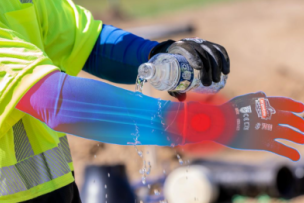And, if you think this is personal protective equipment (PPE) you can do without, think again. The Bureau of Labor Statistics reports 33,940 face injuries occurred in 2018. Of those, there were 750 that involved burns, so MCR Safety stocks a couple of FR rated options. The top industries that recorded face injuries occur in construction, manufacturing and mining.
Many industries may not face hazards that cause direct face injuries. However, most all will have workers operating in winter conditions, which means insulated masks play an important role in keeping workers warm. Balaclavas are one of the most commonly selected types of protection worn due to the insulating materials used.
In this article, MCR Safety is going to highlight some of the different balaclava masks they offer, and other PPE designed to protect one's face.
What Is a Balaclava Mask?
Anyone who has had the misfortune of experiencing harsh winds, snow and cold temperatures, without wearing a protective mask, knows the importance of covering the face. A balaclava mask is a piece of winter headgear designed to protect the head and face while exposing only the mouth, nose and eyes—or sometimes just the eyes. It’s a versatile piece, and some designs also can be converted into a hat or collar. Balaclavas are sometimes called ski masks, but regardless of what you call them, a balaclava pattern keeps your face and head warm in frigid conditions. They also protect the wearer from the sun, dust, wind and even bugs.
They are versatile too. Balaclavas can be worn as full mask, half mask, or as a neck gaiter. Overall, here are some of the core features wearers look for in this type of PPE:
- Breathability
- Comfort
- Lightweight
- Maneuverability
- Snug Fit
- Premium Quality
- Thin Material
- Value and Price
- Versatility
- Warmth
To choose the correct style, you must first understand what makes one mask different from another. This will ensure you get the feature above that's most important to you. In the next sections, MCR breaks down all the styles they currently provide.
MCR Safety’s Winter Selection
A construction laborer working outside in cold weather knows it’s all about keeping your face warm and the cold chill at bay. That’s why a balaclava mask is part of the winter work outfit worn across many industries where workers are outside during winter months. For example, when you’re working on a roof or another outside construction activity and brutal cold winds are pounding you, facial protection becomes the PPE you rely on to stay warm.
MCR Safety understands the hazards you face when working outside in the winter. That’s why they offer high-quality balaclavas to protect you from frostbite and windburn while keeping your head comfortably dry and warm. Their fleece-lined balaclavas are designed to keep you warm in mild to extreme conditions. By covering the face, you stay warm during the worst winter conditions and survive any wind chill Mother Nature blows your way.
As the saying goes, “The show must go on,” and it goes on all year within the construction industry, in cold or hot weather.
Full-face protection includes wind protection that extends below the neckline. MCR Safety’s balaclavas are engineered to keep your entire neck covered and protected. Their non-FR styles are made of soft-stretch polyester fleece material; these garments help protect your head, face, ears and neck from the discomforts of extreme conditions. The material is designed to retain heat and keep you warm.
MCR's premium BLCVB and BLCVL balaclavas have:
• 250-gram polyester fleece stretch fabric lining: for comfort and warmth
• Reflective binding: for enhanced visibility in low light
• Elastic binding around the face: for a secure fit to help protect against wind and cold
• Lightweight material: that fits under a helmet or hard hat without feeling too bulky
• Versatile winter hood: that can be worn in a variety of ways, from ski mask to neck gaiter
In addition to cold weather protection, using an MCR Safety balaclava for layering offers enhanced FR protection for jobs where you’re working with open flames or at risk for combustion or arc flash.
Stay warm when the weather turns bitterly cold with one of MCR's balaclavas.
FR Face Covers and Masks
For those who need FR mask protection, such as those working in oil and gas or utilities, and only require Cat 2 certified products, the BLCVTCN is the one you'll need to purchase. The BLCVTCN is made of 5.5 ounce Westex® TrueComfort® flame-resistant material and provides an Arc Thermal Performance Value (ATPV) of 8.9 cal/cm2. TrueComfort® knits are soft, lightweight and guaranteed to retain their flame resistance for the garment's life.
MCR also stocks the FRMASKDH1 too, which covers the face with two layers of Westex® DH flame-resistant fabric. Click here to read this article in its entirety and learn about MCR Safety's flame-resistant face protection options as well.
Previously Featured on MCR Safety's blog.
.gif?h=444.5&w=669.5&la=en&hash=CDADF41B682B1CC4A6595C8574CA52E3)








Talk to Us!
Leave a reply
Your email address will not be published. Required fields are marked *